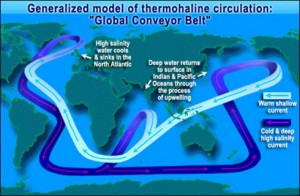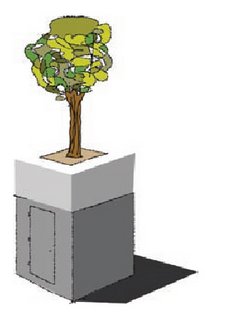Not sure what to think of this. Any ideas what HHO gas really is ?
Kamis, 21 Desember 2006
HHO gas ?
Not sure what to think of this. Any ideas what HHO gas really is ?
Rabu, 20 Desember 2006
World's biggest offshore wind farm in UK
Senin, 18 Desember 2006
Kamis, 23 November 2006
Ed Burtynsky
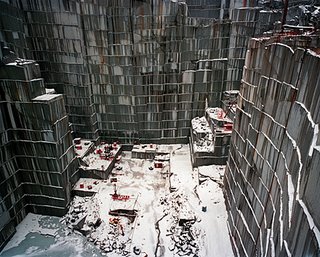 A while ago I saw a link to his work at WorldChanging but somehow I didn't give much attention to it, until it showed up again at Treehugger, this time about a movie that has been made about his work.
A while ago I saw a link to his work at WorldChanging but somehow I didn't give much attention to it, until it showed up again at Treehugger, this time about a movie that has been made about his work.And it grabbed me immediately! His work is at the least inspiring to work on an industrial ecology. The most intrigueing is the fact that his photographs are both beautiful (and even the things that he photographs on itself) and shocking at the same time. He makes it look as if we treat the earth as if it's just LEGO (well that's the feeling I get). This means both good and bad things, since the scale doesn't imply if it's sustainable or not (surprise, surprise here's industrial ecology)
The best thing about it all is the fact that Burtynsky is on a mission to make people aware of this. So here I let you know about his work; go see his TED talk, check out his website and let me know if you find out about a theatre showing his movie in the Netherlands (check out the trailer!).
Selasa, 07 November 2006
Thermohaline Circulation
Senin, 06 November 2006
China working towards partnerships with African countries
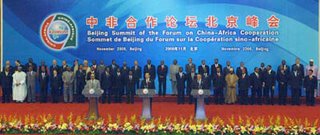
http://english.people.com.cn/200611/06/eng20061106_318573.html
On Saturday, Chinese Premier Wen Jiabao proposed that China and Africa should fully tap cooperation potential and strive to bring their trade volume to 100 billion U.S. dollars by 2010.
The figure will more than double the 2005 level, about 39.7 billion U.S. dollars. In the first nine months, China-Africa trade surged to 40.6 billion U.S. dollars, up 42 percent year-on-year.
At the two-day Summit, the African leaders reiterated their countries' firm commitment to the one-China policy.http://en.wikipedia.org/wiki/One-China_policy
"They (the African countries) reiterated that they adhere to the one-China policy and support China's peaceful reunification," said the declaration.
At the opening ceremony Saturday, President Hu announced a package of aid and assistance measures to Africa including 3 billion U.S. dollars of preferential loans in next three years and the exemption of more debt owed by poor African countries.(us trade numbers)
http://usinfo.state.gov/af/Archive/2005/Apr/26-505429.html
(eu trade numbers)
http://ec.europa.eu/trade/issues/bilateral/regions/acp/index_en.htm
my heart's in accra
http://www.ethanzuckerman.com/blog/?p=1096
Minggu, 05 November 2006
I4D-day 2006: Fuelling the Future
The theme of the day is sustainable technological innovation to support the increasing energy demand in the third world.
from their website:
"Students and researchers of technological universities and representatives of other knowledge institutes and companies in the Netherlands will present during the I4D-day 2006 the I4Deas they have for meeting this challenge. Development economists, politicians and representatives of development agencies will go into debate with them. Film and music will tickle the senses in different ways."If you are into the energy issue, this might be interesting - I looks like a nice multidisciplinary day!
Full program
don't forget to sign up (at their website) if you want to go!
Kamis, 02 November 2006
Funny Weather?
http://www.funnyweather.org/
In any case, this seems like a nice way to introduce your friends and family etc to the complicated topic of climate change in a very funny and easy way.
Rabu, 11 Oktober 2006
Plug-in Diesel Hybrids on Google Talks
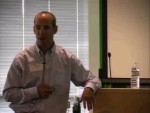 As a follow up to the previous biofuels talk by Vinod Khosla, Google Talks now has a presentation on plug-in diesel hybrids. Reed Benet presents an interesting system view where he argues that bio-diesel is more efficient than ethanol from the production stage (growing, gasification) to its use in a diesel engine. He also talks about interesting possibilities of integrating these cars with the electrical grid.
As a follow up to the previous biofuels talk by Vinod Khosla, Google Talks now has a presentation on plug-in diesel hybrids. Reed Benet presents an interesting system view where he argues that bio-diesel is more efficient than ethanol from the production stage (growing, gasification) to its use in a diesel engine. He also talks about interesting possibilities of integrating these cars with the electrical grid.[via The Energy Blog]
Senin, 02 Oktober 2006
Dutch 'Cradle to Cradle' documentary
The voice-over is in Dutch but all the interviews are in English, so anyone will understand most of this documentary. It can be seen on-line on the following website (click in the upper-right corner on 'Video: bekijk de uitzending AFVAL=VOEDSEL')
http://www.vpro.nl/programma/tegenlicht/afleveringen/30458986/
For all of you interested in eco-design this definitely is a must-read book and must-see docu :)
Rabu, 27 September 2006
Earth warmest for 12000 years
NASA scientists have published an article about the most recent measurements of global temperatures. Main conclusions:
- the Earth is warmer than it has been in the last 12000 years and within 1C of the maximum over the past million years
- the Earth has been warming at a rate of 0.2 C per decade for the last three decades
- the most prominent effect is on land on the Northern Hemisphere because of melting ice covers which induces a positive feedback by changing albedo
- the observations are consistent with predictions that climate scientists made in the 1980s
There is a movie (8.5 MB) on the NASA website which I find particularly illustrative. It shows global temperature changes from 1880 to 2005.
Minggu, 24 September 2006
Microfinance & technology
Rabu, 06 September 2006
natuurbeleving m.b.v.
Senin, 28 Agustus 2006
Sweden Oil Free
Jumat, 04 Agustus 2006
Graduation time !
Rabu, 02 Agustus 2006
China to invest $100 billion in renewable energy
Senin, 10 Juli 2006
Canadian tar sands
Kamis, 06 Juli 2006
Do we need a backup plan for the backup plan?
 A newly released article raises some serious questions about storing CO2 underground in geological formations. The study involved the injection of CO2 into a brine and oil reservoir on the US Gulf Coast. It turns out that the CO2 made the brine water much more acidic, which means that minerals are much more easily dissolved, and the integrity of the reservoir could ultimately be compromised.
A newly released article raises some serious questions about storing CO2 underground in geological formations. The study involved the injection of CO2 into a brine and oil reservoir on the US Gulf Coast. It turns out that the CO2 made the brine water much more acidic, which means that minerals are much more easily dissolved, and the integrity of the reservoir could ultimately be compromised.From the abstract:
"This rapid dissolution of carbonate and other minerals could ultimately create pathways in the rock seals or well cements for CO2 and brine leakage. Dissolution of minerals, especially iron oxyhydroxides, could mobilize toxic trace metals and, where residual oil or suitable organics are present, the injected CO2 could also mobilize toxic organic compounds. Environmental impacts could be major if large brine volumes with mobilized toxic metals and organics migrated into potable groundwater."
A more general explanation can be found here.
[via Treehugger]
Selasa, 04 Juli 2006
Sense and non-sense of blogs
Minggu, 25 Juni 2006
Progress Report on Chinese Eco-Village
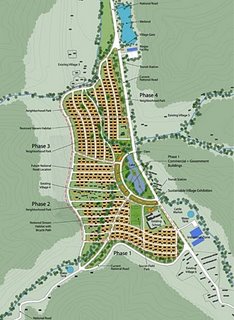 The BBC has an interesting progress report on the Huangbaiyu eco-village project in rural China. Huangbaiyu gained some press partly due to the involvement of some big environmental names. The chair of the project is William McDonough, an architect probably best known for putting the largest green roof in the world on top of a Ford factory.
The BBC has an interesting progress report on the Huangbaiyu eco-village project in rural China. Huangbaiyu gained some press partly due to the involvement of some big environmental names. The chair of the project is William McDonough, an architect probably best known for putting the largest green roof in the world on top of a Ford factory.The financer of the project claimed that he had to make some minor adjustments for financial reasons. This would explain the lack of both solar panels and the special insulation coating specified in the original plans. More curious though is that he found money to add garages to each house (not in the plans) and decided not to face the houses south (bad passive-solar feng shui). In addition to this, some of the locals think that they are very ugly and have concerns about how the lack of a garden could leave them without a reliable income. The situation is summed up by this quote in the article:
"What the small Huangbaiyu experiment shows is the danger of trying to impose a new way of life on people without fully understanding their needs and the realities of their lives."
...but back to McDonough for a second... He's on the editorial board of the Jounal of IE. His writings are very creative and his work with architecture/city planning and product/process design seeks to bridge the gap between IE dreams and reality. Another of his Chinese projects is shown below. With China's rapidly urbanizing population and large amount of land unsuited for agriculture, he proposes holistic designs incorporating ideas such as moving farms onto urban rooftops.
Project links:
China-US Center for Sustainable Development - overview of Huangbaiyu Village
Slideshow of Construction
Project Description from McDonough + Partners
Selasa, 20 Juni 2006
Ecopolis
 The latest issue of New Scientist devotes several pages this month to the environmental transformation of mega-cities. With the UN predicting that by 2007 more people will live in cities than the countryside, creating sustainable cities is more important than ever.
The latest issue of New Scientist devotes several pages this month to the environmental transformation of mega-cities. With the UN predicting that by 2007 more people will live in cities than the countryside, creating sustainable cities is more important than ever.The articles dive into many IE concepts and details some interesting progress that has been made around the world, with one article devoted to developments on eco-cities in China. One of the articles can be found here.
[via Archinect]
Sabtu, 17 Juni 2006
Thinking outside of the Barrel
Check it out
Senin, 12 Juni 2006
Who Killed the Electric Car?
 Coming soon is a new movie documenting the history of the EV1 electric vehicle in California. Starting in the mid 1990's, GM leased over 800 of these vehicles to consumers. The car was received enthusiastically, but eventually the program was suddenly cancelled in 2003.
Coming soon is a new movie documenting the history of the EV1 electric vehicle in California. Starting in the mid 1990's, GM leased over 800 of these vehicles to consumers. The car was received enthusiastically, but eventually the program was suddenly cancelled in 2003.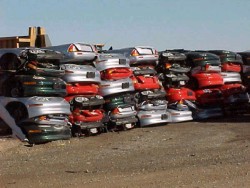
GM claimed that they couldn't sell enough cars to be profitable, despite long lists of people who wanted to lease them. Amid public protests, the cars were crushed, which only served to fuel speculation that GM intended for the program to fail despite public support. The article in Wikipedia goes into more detail about allegations related to the project cancellation.
[via Clean Break]
Update: A 20 minute interview with the film director is available here as a video or mp3
Greenspan warns of energy crisis
 Alan Greenspan, a leading US economist best known for his power to scare stock markets with his carefully-worded subtle phrases, recently gave a 3 hour testimony before a US Senate committee recommending a much quicker development of alternative energy sources.
Alan Greenspan, a leading US economist best known for his power to scare stock markets with his carefully-worded subtle phrases, recently gave a 3 hour testimony before a US Senate committee recommending a much quicker development of alternative energy sources.His main concern was that energy prices would push up inflation and threaten the economy. In addition, a terrorist attack on a Middle Eastern oil refinery could raise prices even more.
He further noted that much of the world's oil reserves are owned by governments not exactly friendly with the US. The recent high energy prices have created a "very serious issue" where these governments are receiving tremendous amounts of cash.
He also debunked corn-based ethanol, but spoke highly of the possibilities of cellulosic ethanol. Liquified natural gas was also mentioned as another replacement for petroleum.
Full Article
[via Renewable Energy Access]
Green Steel
 CSIRO, Australia's national science agency, is working on a way to help industries produce cleaner steel. Their idea is to have steel mills use charcoal produced from trees planted to combat salinity.
CSIRO, Australia's national science agency, is working on a way to help industries produce cleaner steel. Their idea is to have steel mills use charcoal produced from trees planted to combat salinity.The charcoal is much cleaner and burns faster than the coke currently used. Further studies have shown that this process can use 65% less CO2/tonne of iron even when including energy for growing, processing, and transport. A more in-depth exploration of the idea can be found in CSIRO Solve Magazine.
Rabu, 31 Mei 2006
UN Decade of Education for Sustainable Development
Gore makes movie on climate change
Former vice president Al Gore features in a much discussed movie on climate change. I haven't seen it yet so if anyone can find a good link let me know. Here's a link to a discussion on Nature News.
Selasa, 30 Mei 2006
Climate Change linked to earthquakes
€10 billion for Fusion Reactor research
The €10 billion international project ITER will test whether fusion could become a viable source of abundant and clean energy for the future (via new scientisttech). I wonder what could be done with that kind of money in PV research.
Goldman Sachs Invests in Cellulose Ethanol
The Canadian company Iogen, a pioneer in producing cellulose ethanol, has announced that Goldman Sachs will invest 30 million Canadian dollars in this technology. Iogen runs the only plant in Ottawa to manufacture cellulose ethanol, though currently only as a demonstration project. Together with Shell and Volkswagen, Iogen is also looking into the economic viability of setting up a cellulose ethanol production plant in Germany. (via GAVE)
Rabu, 24 Mei 2006
Plug-in hybrids visit DC
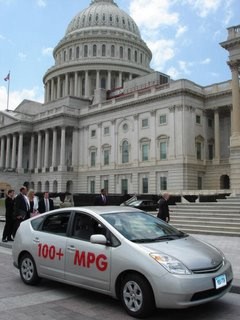 This is such a great marketing move... While automakers talked to the U.S. Congress about their problems, one company parked their solution outside. The press release shows quite a few famous politicians taking a ride around Capitol Hill.
This is such a great marketing move... While automakers talked to the U.S. Congress about their problems, one company parked their solution outside. The press release shows quite a few famous politicians taking a ride around Capitol Hill.As for the price, the current estimate is 10-20% more than hybrids. There's also some interesting discussion about how these cars could be integrated with large-scale renewables to help balance the power grid.
From the calcars.org press release:
On May 18, CEOs of the Big Three automakers came to Washington DC to meet with Congressional leaders and discuss the industry's woes. We saw an opportunity to introduce Congress to a solution using existing technology that can make a big dent in our oil dependence and also help Detroit back to prosperity -- should it choose to take the opportunity. After a whirlwind fundraising campaign CalCars flew in one of its plug-in Priuses from California, and the journey began. This was the first time plug-in hybrids were seen in public in our nation's capitol.
[via BioConversion Blog]
Rabu, 17 Mei 2006
History of energy
Sabtu, 13 Mei 2006
Wealth from Waste
 A short excerpt:
A short excerpt:SYNTHETIC CHEMISTRY: WEALTH FROM WASTE
This is the first of a series of articles on the romance of synthetic chemistry in which science has solved the mystery for turning waste into wealth.
“Don’t throw that away!” This is the battle cry of the great synthetic chemical industry which makes everything from hair-brush handles to T.N.T. from stuff that was once just waste. If you want to buy some perfume, the odds are that the bottle will contain odors extracted from coal tar, once a nightmare to factories who paid people to get rid of it.
[via Modern Mechanix]Sabtu, 29 April 2006
Fuel cell train in Japan
Selasa, 25 April 2006
Tornado Technology
 Veridium is a green technology company that is marketing an interesting method for processing biomass and other wastes in a high-speed vortex. Their website has some videos showing it in action. A more in depth article about the technology can be found here.
Veridium is a green technology company that is marketing an interesting method for processing biomass and other wastes in a high-speed vortex. Their website has some videos showing it in action. A more in depth article about the technology can be found here.From the press release:
"Veridium's Tornado Generator(TM) accelerates compressed air to supersonic speeds in a closed cyclonic chamber where the air is powerful enough to almost instantly grind, flash desiccate and atomize solid and liquid wastes and other materials into micron sized powders. The Tornado Generator(TM) is a completely contained system with no internal moving parts that is powered by compressed air. It can safely and cost-effectively and rapidly process a very broad array of wastes including agricultural wastes, municipal wastes, industrial wastes, and construction and demolition wastes."
[via Greenshift Corporation]
Sabtu, 22 April 2006
Happy Earth Day!
 As much as we talk about what the US isn't doing environmentally, today they are celebrating the 36th annual Earth Day. I haven't heard of anything similar in Europe... Is this true? If so, then why not? ...the tulips are definitely having a party.
As much as we talk about what the US isn't doing environmentally, today they are celebrating the 36th annual Earth Day. I haven't heard of anything similar in Europe... Is this true? If so, then why not? ...the tulips are definitely having a party.
Sabtu, 15 April 2006
Field Guide to IE?
 So maybe the chapters on LCA and cleaner production are missing, but Infrastructure provides an interesting artistic & explanatory view of the industrial landscapes around us.
So maybe the chapters on LCA and cleaner production are missing, but Infrastructure provides an interesting artistic & explanatory view of the industrial landscapes around us.From the book's Amazon.com site:
"Replete with the author's striking photographs, Infrastructure is a unique and spectacular guide, exploring all the major "ecosystems" of our modern industrial world, revealing what the structures are and why they're there, and uncovering beauty in unexpected places. Covering agriculture, resources, the water supply, energy, communication, transportation, and waste, this is the "Book of Everything" for the industrial landscape."
Senin, 03 April 2006
Bye Bye Coral :(
The coral is not only very important for the wild life that inhabits these reefs, but it is also important for people living in the Carribean, as it has reduced harmfull effects of hurricanes and Tsunamis in the past.
Minggu, 02 April 2006
Someone's view on IE
For the non-dutchies, it says: "New master programme of Industrial Ecology not completely convincing..."
I think it's quite genious, I just love the idea of the flower factory ;)
Selasa, 28 Maret 2006
Innovations Journal - Technology/Governance/Globalization
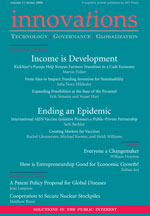 innovations is an interesting new journal that strives to go beyond theory and into practical solutions for many of the same problems IE deals with.
innovations is an interesting new journal that strives to go beyond theory and into practical solutions for many of the same problems IE deals with.One of its editors is Iqdal Quadir, best known for starting a for-profit company that uses microcredit to make cell phones widely available to the poor in Bangladesh. His company, GrameenPhone "has increased the country's GDP by a far greater amount than repeated infusions of foreign aid."
From their website: (entire issue is free for download)
Innovations is the only academic journal of its kind. The most widely read academic journals dealing with the interaction of technology and governance take a 30,000-foot view of both policy challenges and proposed policy solutions. Rarely do academic analyses of global policy challenges begin by looking at innovations. Rarely do practitioner-focused narratives seriously address innovations in their global context. Innovations does both.
The audience for Innovations is a broad community of change agents. The content in Innovations brings together accounts (narratives), accounting (indicators), and accountability (governance). Innovations will be of interest to public servants whose method is entrepreneurial, and entrepreneurs whose projects have a public conscience; innovators interested in analysis, and scholars interested in innovations.
Each issue of Innovations analyzes best local practices in a global context. Innovations is based on two simple premises. The first: while culture and economics do create significant differences among populations, creativity is a characteristic shared by people everywhere. The second: while many pressing societal challenges are global, their solutions are local. Innovations in one place can inform and inspire innovations elsewhere.
Senin, 27 Maret 2006
Brainiax
Minggu, 26 Maret 2006
I=(P+1)AT
Sabtu, 25 Maret 2006
Sustainable Carpet
 The BBC has a very interesting audio interview here (or here) with Ray Anderson, the founder of Interface Corporation. Interface is a carpet company that has gained widespread attention for its innovative implementation of sustainability practices... which is especially interesting considering the dependence of the carpet industry on petrochemicals.
The BBC has a very interesting audio interview here (or here) with Ray Anderson, the founder of Interface Corporation. Interface is a carpet company that has gained widespread attention for its innovative implementation of sustainability practices... which is especially interesting considering the dependence of the carpet industry on petrochemicals.The interview talks about how their business decided to adopt sustainability principles along with their vision for the future where they could close the material cycle with their products. There's also a story on how one of their most successful products incorporates biomimicry, along with how dematerialization of their product led to some surprising LCA results.
Also...
Interface Sustainability Report
Dictionary of Sustainable Management
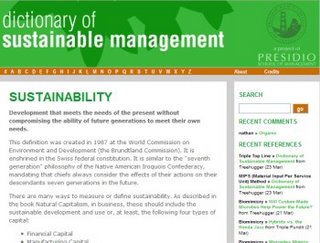
From their website:
"This Dictionary of Sustainable Management is an open dictionary for business leaders and students of sustainability and business-related terms. It is a project of the Presidio School of Management. The purpose of this effort is to help people better understand how sustainability concepts are creating new understandings in the worlds of business, government, and society.
The dictionary is open in that anyone can comment on any definition. Periodically, the creators of the dictionary may compound comments into new editions."
Jumat, 24 Maret 2006
Again Complex System
The page that I wanted you guys to visit is,
http://www.red3d.com/cwr/boids/
And you can see the similation result of flying birds, which is based on Muti Agent Simulation (= a kind of complex system)
Want to know more about Cleaner Production in China?

Hey everybody, maybe some of you are interested in environmental issues in China.. Here I find a english website about Cleaner Production in China. It contains "a current and comprehensive information source on China's campaign to reduce pollution. Background information on Cleaner Production (CP) and CP tools (such as ISO14000), information on CP in China and links to many international sites"
Hope it could be useful! http://www.chinacp.com/
Kamis, 23 Maret 2006
Game Set and Match II - Delft

On March 29-31 the TU Delft Hyperbody Research Group is hosting Game Set and Match II, a symposium that discusses the integration of architecture and digital technology. Many of the topics are highly creative/artistic and push back the borders of science fiction.
A few highlights from the schedule:
- Redefining Creativity in the Practice of Architecture
- Liquid Constructions
- Cooperative Buildings, Ambient Intelligence and the Disappearing Computer
- Developing an Articulated Vehicle - The H- Series
- Utilization of Advances in Material and Computer Science for Building Structures
- Theory and Applications of Biological Inspired Computer Aided Architectural Design
- Applications of Evolutionary Structural Optimisation Techniques to Architectural Structures
- PING GENIUS LOCI: Interfacing Architecture for a Networked Society
Selasa, 21 Maret 2006
Complexed?
Be a BOID !!!
After all, is IE complexed? If so, how?
Sabtu, 18 Maret 2006
Microbial Fuel Cell
Kamis, 16 Maret 2006
h to the izzo
According to MIT Technology Review, "researchers at GE say they've come up with a prototype version of an easy-to-manufacture apparatus that they believe could lead to a commercial machine able to produce hydrogen via electrolysis for about $3 per kilogram -- a quantity roughly comparable to a gallon of gasoline -- down from today's $8 per kilogram. That could make it economically practical for future fuel-cell vehicles that run on hydrogen."
Lecture "The Day After Tomorrow" by Dr. Harm Jonker
Location: Aula Lecture Theater D; Delft University of Technology, The Netherlands
Date: Thursday March 23rd
Time: 16:00 - 17:00
Senin, 13 Maret 2006
The Gift
These gifts as well as CO2 offsetting for your own activities and for companies and products to save energy are available at Climate Care.
Guide to saving what could be lonely planet
From next month, in all new editions of their guides warnings will appear about the impact of flying on global warming and alternative ways of reaching destinations are added. To read more on this click here.
On the website of the Rough Guide information about climate change is provided and you can calculate the CO2 emmisions of a flight you are considering to take online. With the Climate Care calculator you can calculate not only the CO2 emmisions of flights, but also of household and car travel and offsetting your carbon emmissions by supporting projects that reduce greenhouse-gas emissions is suggested. End of this year "The Rough Guide to Climate Change" will be published.
Jumat, 10 Maret 2006
Future of solar power systems?
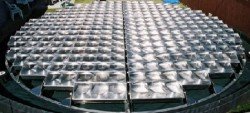 As more people seek to use renewable energy, some companies are trying to give photovoltaics a more competitive edge through the use of optics and mirrors to concentrate sunlight. Pyron Solar uses such a system and in a NREL test they were able to achieve a 37.3% conversion efficiency. Another such company is Energy Innovations, which has developed an interesting low-cost method for allowing a field of focusing mirrors to track the sun. More details can be found in an article by Wired Magazine
As more people seek to use renewable energy, some companies are trying to give photovoltaics a more competitive edge through the use of optics and mirrors to concentrate sunlight. Pyron Solar uses such a system and in a NREL test they were able to achieve a 37.3% conversion efficiency. Another such company is Energy Innovations, which has developed an interesting low-cost method for allowing a field of focusing mirrors to track the sun. More details can be found in an article by Wired Magazine
Flushable Diapers
 gDiapers has created a new spin on the concept of disposable diapers. Instead of sending diapers to the landfill where they could pose a possible health hazard, they are flushed to the wastewater treatment facility. This allows for safer treatment of wastes and recovery of the various materials.
gDiapers has created a new spin on the concept of disposable diapers. Instead of sending diapers to the landfill where they could pose a possible health hazard, they are flushed to the wastewater treatment facility. This allows for safer treatment of wastes and recovery of the various materials.For the more adventurous, they claim that these biodegradable diapers can also be composted. The urine is an excellent source of nitrogen, and the diapers contain a super absorbing polymer that is also used in potting soils to increase water retention.
More specific details about the technology can be found here.
Senin, 06 Maret 2006
NREL energy publications
Sabtu, 04 Maret 2006
Gardening in the 'Hood
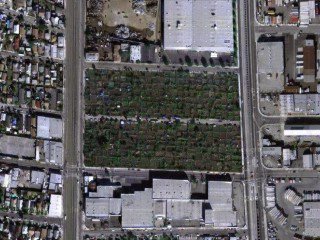
Ask any American what comes to mind when they hear "South Central Los Angeles", and they'll say race riots, gangs, drugs, and poverty. However, in this same area, 350 immigrant families have worked for the past decade to create the largest community garden in the US (5.6 hectares), despite being sited in an industrialized area. Unfortunately, they've been making the news lately due to plans to convert the land into a warehouse for Walmart.
From an IE perspective, we often try to find solutions by examining system levels, and it sometimes feels like we're trying to put a patch onto a problem that's broken on so many different levels. Although these farmers are facing serious problems stemming from the political and economic realm, their past decade of work has shown that some really inspiring change can come from within society.
The satellite picture says it all: an island of green in a sea of concrete.
March 7 – Osiris Lunch lecture “Sustainable product design, second generation”
 From the Osiris newsletter:
From the Osiris newsletter: In the middle of the nineties the first wave of sustainable product design started in the Netherlands. But nowadays it has become quiet on the side of the policy makers. Product policy seems to be dead! Gladly there are people that don’t take no for an answer. Harry te Riele is writer of “Playing with Hyenas”, a report on the second generation product treatment. He is researcher and advisor for DRIFT, a research institute at the Erasmus University Rotterdam. The lecture will be in English, admission is free.
Date: Tuesday, March 7th 2006
Time: 12.30 – 13.30
Location: room U, Industrial Design Engineering TU Delft, Landbergstraat 15
Lecturer: Harry te Riele
Rabu, 01 Maret 2006
Energy data
http://www.eia.doe.gov/emeu/international/energy.html
Might be useful for those who need it.
IE on Science Magazine website
There are about 150 kilograms of copper in current use for each person in North America. The researchers then multiplied the copper used per person by total world population, using standard population estimates to project into the future. By the mid-21st century, if everyone in the world used copper at North American rates, every scrap of known copper ore would be mined
Youth Encounter on Sustainability
Deadline for applications is March 31, 2006.
Are things actually getting better?
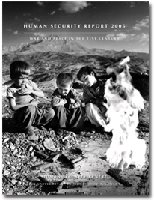 The recently released Human Security Report concluded that there has been an overall drop in armed conflicts. The results surprised many people as there is a perception that things have become worse since Sept. 11th. This article dives into the psychology of optimism & pessimism and seeks to understand how we use these outlooks to shape our action in the world. As IE seeks to bridge the gap between business and environment, we too find ourselves trying to make sense of positive and negative views on the state of the world.
The recently released Human Security Report concluded that there has been an overall drop in armed conflicts. The results surprised many people as there is a perception that things have become worse since Sept. 11th. This article dives into the psychology of optimism & pessimism and seeks to understand how we use these outlooks to shape our action in the world. As IE seeks to bridge the gap between business and environment, we too find ourselves trying to make sense of positive and negative views on the state of the world.A few excerpts:
"Unless you believe that the future can be better you are unlikely to step up and take responsibility for making it so. If you assume there is no hope, you guarantee there will be no hope."
"We are more concerned about risks that may lead to losses than risks that lead to gains."
"Resilient people tend to have three things in common: they have a strong value system and ability to make meaning out of life; they are excellent improvisors and adaptors given life's events; and they are good are perceiving the reality accurately, for better or worse, in any given situation."
Selasa, 28 Februari 2006
Aerogels finding new applications
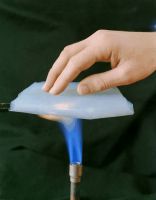 Silica aerogels are extremely low-density solids nicknamed "frozen smoke" that hold the record for being the best insulators known. Their widespread adoption could dramatically increase energy efficiency in many areas of technology. While their production costs are still prohibitive for everyday uses, their potential is being realized more and more within industrial applications.
Silica aerogels are extremely low-density solids nicknamed "frozen smoke" that hold the record for being the best insulators known. Their widespread adoption could dramatically increase energy efficiency in many areas of technology. While their production costs are still prohibitive for everyday uses, their potential is being realized more and more within industrial applications.Wired News: A Solid That's Light as Air
Wikipedia - Aerogels
Aerogels made out of carbon can store an incredible amount of electricity for their size and are generating interest especially among those developing hybrid cars.
Aerogel Composite Announces ENERGel(TM) Ultracapacitor
Jumat, 24 Februari 2006
Algae remove CO2 and NOx from flue gas
Greenfuel Technologies has developed a method to use algae to remove CO2 (50-80%) and NOx (80-90 %) from flue gas. The algae can then be used as biofuels thereby replacing fossils.
Kamis, 23 Februari 2006
a solid idea
A smart solution to the problem of tree roots uplifting and breaking sidewalks: rubber sidewalks made from 100% recycled car tires. Air and water can pass to the root structure, and the material’s flexibility allows the tree to grow more freely. (Truck sold separately.)
Rabu, 22 Februari 2006
Publishing LCA data
The definition of industrial ecology
First, let's agree on some principles of a definition here.
1. A definition should be clear and unambiguous. Thus "the science of sustainablity" is not a good definition, because it introduces this nasty and vague term sustainability.
2. A definition should at the same time be open enough to accommodate unorthodox methods and analyses. Thus, a term like "quantitative" should not be part of it, as it would rule out all non-quantitative approaches.
3. IE is primarily a science, a field of research. In that way, it is similar to ecology, economics, astronomy or history. Next to it, people may connect it with strategies, but this should not be part of the definition. When economics is "the study of the choices people make to cope with scarcity", there is no mentioning of using economic theory to become rich. Thus, IE should not be defined as "the shifting of industrial process from open loop systems, in which resource and capital investments move through the system to become waste, to a closed loop system where wastes become inputs for new processes" (Wikipedia), just becauses it mixes up theory and action.
4. ...
5. ...
6. ...
Other principles will come in an interaction. Shall we agree to discuss principles by way of such enumerated points?
Then, back to IE. As always, ecology provides a useful analogue here. Three useful definitions on the web for ecology are
a) The science of the relationships between organisms and their environments
b) The study of the relationship between plants and animals (including humans) and their environment
c) The study of how organisms interact with each other and their physical environment.
Each of these three can be easily changed to fit IE:
a) The science of the relationships between industrial activities and their environments
b) The study of the relationship between economic actors (including humans) and their environment
c) The study of how industries interact with each other and their physical environment.
I would appreciate to get some comments on these trials.
Selasa, 21 Februari 2006
gmail account
lunch lecture on power systems
The crucial integration of power systems: combining fossil and sustainable energy using fuel cells. Dr. Kas Hemmes
21st of February 06, 12:30 Mekelweg 10 @ the Cultural Center
Hurry! its a late post.
Senin, 20 Februari 2006
US energy use to 2030: Business as Usual
The Energy Information Administration published two reports: one with forecasts of US energy use and one for world wide energy use. The main message: business as usual rules !
Everything about green cars
Government energy R&D (still) mainly to fission
habitat for humanity
Massachusetts Institute of Technology (MIT) architects developed the ultimate tree house—a very unique home that is built from 100% living nutrients including soy-based plastic windows. The building utilizes gray water biological filtration and solar driven ventilation and water heating.
resilience versus adaptiveness....
resilience it the ability of a system to recuperate from distrubances. I understand it then as the ability to fall back into the old state after a certain schock or change. so in that sence it is very different from its adaptiveness, the ability of adapting to changes in the enviroment.
Or are both terms related and similar? Who can help me out? Thanks in advance
efficiency versus effectiveness - what a mess!
but ofteh we said first companies have to optimise internallt (which I understand as efficiency in that sense) before IE should be apllied (using the so far not used streams effectively).
does that mean then effectiveness OVER efficiency or effectiveness NEXT to efficiency?
I would also suppose that from a systems perspective an effective industrial park is at the same time (or leads to) an effiecient system. Do you agree?
Minggu, 19 Februari 2006
Shell opts for sequestration
Jumat, 17 Februari 2006
Rabu, 15 Februari 2006
Workshop on complexity in Industrial Ecology
Osiris Lunch lecture on sustainable product design
Date: Tuesday 7 maart
Time: 12:30 – 13:30
Sustainable product design, second generation
Location: Faculteit Industrieel Ontwerpen TU Delft, Landbergstraat 15
Speaker: Harry te Riele
Entrance fee: for free
Language English
Lovelock rejects Biofuels
In his recent book "The revenge of Gaia" James Lovelock, founding father of the Gaia Hypothesis, has an interesting different perspective on the (lack of) possibilities for biofuels to replace fossil fuels: "even if these natural products were used only for transport,...,it would require us to burn every year about two to three gigatons of carbon as bio fuel. Compare this quantity with our yearly food consumption of half a gigagton; to grow this much already uses more than may be safe"
Selasa, 14 Februari 2006
Fuel Cell in music players
Toshiba announced that it has developed two prototype direct methanol fuel cell (DMFC) units and begun tests to validate their operation with mobile audio players. These are cool gadgets ! But what about this: would this technology add a substantial amount to current VOC emissions ?
LCI data at NREL
Senin, 13 Februari 2006
SETAC Globe LCA Student Forum
Minggu, 12 Februari 2006
Short description of MSc studentprojects
Hydrogen in remote areas
Coal Ash Pavement Technology to Mitigate Heat Island Effect
Via triplepundit.
Jumat, 10 Februari 2006
UK Report on climate change
Kamis, 09 Februari 2006
The quote and checking this system
Understanging and implementating are two different things.
Tonight I had conversations on literature; about who studies it and who produces it.
Also, in Japan we don't have IE education programme, but still there are lots of people concerened with IE without noticing the meaning of it.
Does IE have emotional aspects like literature or other arts?
If so, why do human try to analyze this emotion?
Do we really feel other's emotion?; their pains are not your pain as long as you share it or you have experienced it before.
GRC conference August 2006
Rabu, 08 Februari 2006
The first (?) Industrial Ecology blog !
I made this blog in order to have a space for some informal communication about Industrial Ecology. For a start I invite all 1st and 2nd year students and all teachers of the Interuniverstity MSc IE programme to participate.
The idea is that everybody can post anything (preferably relevant to Industrial Ecology) on this blog. Opinions, news items, pictures anything goes.
First let me ask you to react on the following quote:
"The general public does not understand what the term Industrial Ecology means which makes its worldwide implementation impossible".
Rene
